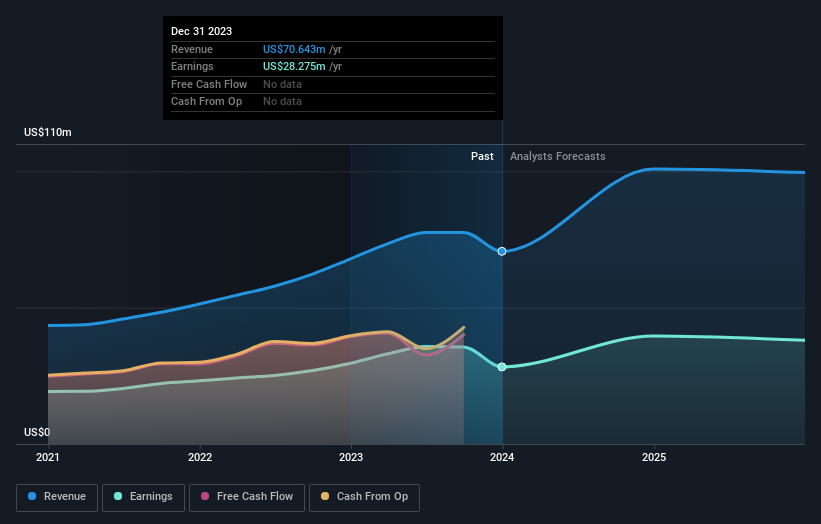With 57% ownership in Bank7 Corp. (NASDAQ:BSVN), insiders continue to have the largest holding even though they have sold shares recently
Key Insights
Insiders appear to have a vested interest in Bank7's growth, as seen by their sizeable ownership
50% of the business is held by the top 3 shareholders
To get a sense of who is truly in control of Bank7 Corp. (NASDAQ:BSVN), it is important to understand the ownership structure of the business. And the group that holds the biggest piece of the pie are individual insiders with 57% ownership. That is, the group stands to benefit the most if the stock rises (or lose the most if there is a downturn).
Despite recent sales, insiders own the most shares in the company.
In the chart below, we zoom in on the different ownership groups of Bank7.
View our latest analysis for Bank7
What Does The Institutional Ownership Tell Us About Bank7?
Many institutions measure their performance against an index that approximates the local market. So they usually pay more attention to companies that are included in major indices.
Bank7 already has institutions on the share registry. Indeed, they own a respectable stake in the company. This suggests some credibility amongst professional investors. But we can't rely on that fact alone since institutions make bad investments sometimes, just like everyone does. When multiple institutions own a stock, there's always a risk that they are in a 'crowded trade'. When such a trade goes wrong, multiple parties may compete to sell stock fast. This risk is higher in a company without a history of growth. You can see Bank7's historic earnings and revenue below, but keep in mind there's always more to the story.
Bank7 is not owned by hedge funds. Our data suggests that William Haines, who is also the company's Top Key Executive, holds the most number of shares at 19%. When an insider holds a sizeable amount of a company's stock, investors consider it as a positive sign because it suggests that insiders are willing to have their wealth tied up in the future of the company. The second and third largest shareholders are Lisa Haines and Julee Thummel, with an equal amount of shares to their name at 16%. Additionally, the company's CEO Thomas Travis directly holds 2.8% of the total shares outstanding.
To make our study more interesting, we found that the top 3 shareholders have a majority ownership in the company, meaning that they are powerful enough to influence the decisions of the company.
Researching institutional ownership is a good way to gauge and filter a stock's expected performance. The same can be achieved by studying analyst sentiments. There are a reasonable number of analysts covering the stock, so it might be useful to find out their aggregate view on the future.
Insider Ownership Of Bank7
While the precise definition of an insider can be subjective, almost everyone considers board members to be insiders. Company management run the business, but the CEO will answer to the board, even if he or she is a member of it.
Insider ownership is positive when it signals leadership are thinking like the true owners of the company. However, high insider ownership can also give immense power to a small group within the company. This can be negative in some circumstances.
It seems that insiders own more than half the Bank7 Corp. stock. This gives them a lot of power. That means they own US$144m worth of shares in the US$253m company. That's quite meaningful. Most would be pleased to see the board is investing alongside them. You may wish todiscover (for free) if they have been buying or selling.
General Public Ownership
With a 19% ownership, the general public, mostly comprising of individual investors, have some degree of sway over Bank7. While this group can't necessarily call the shots, it can certainly have a real influence on how the company is run.
Next Steps:
It's always worth thinking about the different groups who own shares in a company. But to understand Bank7 better, we need to consider many other factors. Take risks for example - Bank7 has 2 warning signs we think you should be aware of.
But ultimately it is the future, not the past, that will determine how well the owners of this business will do. Therefore we think it advisable to take a look at this free report showing whether analysts are predicting a brighter future.
NB: Figures in this article are calculated using data from the last twelve months, which refer to the 12-month period ending on the last date of the month the financial statement is dated. This may not be consistent with full year annual report figures.
Have feedback on this article? Concerned about the content? Get in touch with us directly. Alternatively, email editorial-team (at) simplywallst.com.
This article by Simply Wall St is general in nature. We provide commentary based on historical data and analyst forecasts only using an unbiased methodology and our articles are not intended to be financial advice. It does not constitute a recommendation to buy or sell any stock, and does not take account of your objectives, or your financial situation. We aim to bring you long-term focused analysis driven by fundamental data. Note that our analysis may not factor in the latest price-sensitive company announcements or qualitative material. Simply Wall St has no position in any stocks mentioned.


